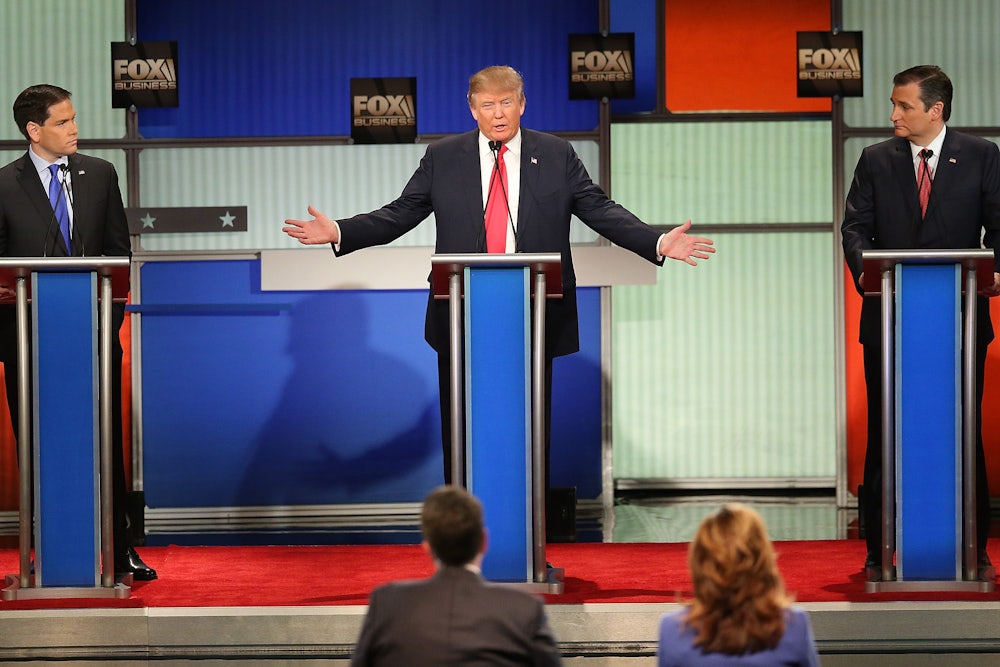The defining development of the sixth Republican presidential primary debate was this: For the first time since the campaign entered its late stage, Ted Cruz was willing to skirmish with Donald Trump, and he did it more effectively than any of the dozen-plus other candidates who have tried before him.
He also made an uncharacteristic error. Halfway through the evening, the Texas senator reprised a campaign trail attack on Trump’s “New York values,” knowing that Trump would retaliate by characterizing it as a slander against September 11 first responders—and it boomeranged on him.
Before that, Cruz and Trump tangled over the question of Cruz’s birthright citizenship. In that exchange Cruz demonstrated his mastery of law and formal debate—“the legal issue is quite straightforward,” Cruz said, “some of the more extreme ones insist that you must not only be born on U.S. soil, but have two parents born on U.S. soil. Under that theory, not only would I be disqualified, Marco Rubio would be disqualified, Bobby Jindal would be disqualified and, interestingly enough, Donald J. Trump would be disqualified.”
Trump rebutted with his characteristic mastery of insult-comic performance. “Here’s the problem,” Trump said. “We’re running. He does great. I win. I choose him as my vice presidential candidate, and the Democrats sue and we can’t take him along for the ride. I don’t like that. OK?”
The kinetic nature of the exchange made it genuinely impossible to determine a winner, despite the fact that it was the most anticipated fight of the entire primary.
Under different circumstances, this might’ve been cause for Republican Party officials, who are eager for Trump and Cruz to annihilate one another, to celebrate. But within the context of the full debate, it represented the beginning of a terrifying new chapter: one in which Cruz and Trump have settled into their final roles as the only plausible competitors for the Republican nomination.
The GOP establishment’s dual hopes for Thursday’s debate were to see Trump and Cruz stumble, and Marco Rubio rise to supersede at least one of them.
Instead, as Trump and Cruz parried, Rubio interjected, not with a transcendent moment, but with a familiar recitation of a relevant portion of his stump speech. And then another. And another.
Here’s a representative sample:
I hate to interrupt this episode of Court TV. But I think we have to get back to what this election has to be about. OK? Listen, this is the greatest country in the history of mankind. But in 2008, we elected a president that didn’t want to fix America. He wants to change America. We elected a president that doesn’t believe in the Constitution. He undermines it. We elected a president that is weakening America on the global stage. We elected a president that doesn’t believe in the free enterprise system.
This contained no subtext suggesting anyone watching should prefer Rubio to Trump or Cruz.
Rubio’s true distinction Thursday was to get dragged into an unwanted skirmish with Chris Christie (with whom he’s been feuding for weeks) and then to watch Christie talk macho to President Barack Obama more effectively than he could.
I hope the president is watching tonight, because here’s what I’d like to tell him. Mr. President, we’re not against you. We’re against your policies. When you became president, you had a Democratic Congress and a filibuster-proof Democratic Senate. You had only 21 Republican governors in this country. And now after seven years of your policies, we have the biggest majority we’ve had since the 1920s in the House; a Republican majority in the Senate; and 31 out of 50 Republican governors. The American people have rejected your agenda and now you’re trying to go around it. That’s not right. It’s not constitutional. And we are going to kick your rear end out of the White House come this fall.
This was the second most meaningful portion of the debate—where Rubio failed to climb out of the doldrums and was unable to outshine any of the other underdog candidates, all of whom must exit the race for Rubio to have a straightforward opportunity to outshine the frontrunners.
Even then—even if Rubio had vanquished all of the also-rans tonight and taken the frontrunners down a peg—he’d be entering a three-way race five percentage points behind Cruz and fourteen behind Trump.
As the debate wound to a close, Rubio engaged in a substantive fight with Cruz over the merits of their tax plans, neither of which has much merit. As that exchange dove into the weeds, Christie charged in to remind both candidates that they were supposed to be responding to a question about entitlements.
Rubio said he’d be happy to address entitlements.
“You already had your chance Marco,” Christie responded. “You blew it.”
Christie wasn’t wrong. And for that reason, this debate went about as terribly for the Republican elite as it could possibly have gone.
